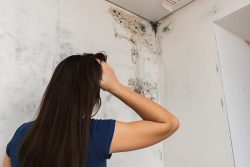Dangers of Mold in Your Home or Office
May 4, 2023 3:52 pm Leave your thoughts Dangers of Mold in Your Home or Office
Dangers of Mold in Your Home or Office
Mold is a common problem in homes and businesses. It can grow on any material that is moist, including wood, paper, carpet, and insulation. If you have a mold problem in your home, it’s important to get it cleaned up and dried quickly. Doing so will keep mold from growing again and prevent allergic reactions or other health problems!
Allergic Reactions
When a person has a sensitive immune system, mold can trigger an allergic reaction. When an allergen reaches your bloodstream, it causes your immune system to release inflammatory chemicals that cause symptoms in the nose, throat, eyes or skin. Examples include pollen, dust mites, animal dander, medication, insect venom and mold. People who are allergic to mold can experience allergy-like reactions year-round. Some molds, like alternaria, aspergillus, cladosporium and penicillium, are more likely to cause reactions than others. The best way to avoid mold allergies is to keep your indoor environment clean. Washing clothes, rinsing off the floors and removing carpeting can reduce exposure to mold spores. Additionally, stay away from damp places and piles of wet leaves.
Respiratory Issues
Mold spores can cause respiratory problems in people who are sensitive or allergic to mold. Respiratory symptoms can also develop in people who have asthma. Asthma can be aggravated by exposure to mold, and it is possible for a person with asthma to develop another disease like pneumonia. It is important to find and fix the source of excess moisture in your home or office before you can have the mold removed. This may be a water leak or excessive humidity. It is also important to remove furniture, carpeting or other building materials that are wet or have a high amount of humidity in them. These are areas where fungus is most likely to grow.
Irritation
Mold spores float through the air, and when they land on your skin, eyes, nose or throat, you can get irritation. The irritation can be especially bad if you have allergies or asthma. Symptoms of a mold allergy include watery eyes, runny nose, itching, sneezing, coughing and wheezing. They may also cause fatigue, headache and shortness of breath. A person’s immune system responds to mold spores by overreacting and producing large amounts of allergy-causing antibodies. This overreaction causes an allergic reaction that varies in severity.
Infections
Molds can cause infections if they are inhaled or touched by a person who has a weakened immune system. Those with chronic lung disease, diabetes or immune-suppressing drugs such as chemotherapy, HIV/AIDS or other illnesses are especially vulnerable. Other respiratory issues, such as sinus problems and allergies, have also been linked to mold exposure in those with a weakened immune system. These symptoms generally appear within 2 to 9 hours of exposure and last for one to three days.
Got questions about how to best handle mold in your home? Be sure to contact our mold testing professionals here at HealthSafe Inspections, Inc. to learn more about what we can do to keep your property mold-free!
Categorised in: Mold
This post was written by admin

 Dangers of Mold in Your Home or Office
Dangers of Mold in Your Home or Office